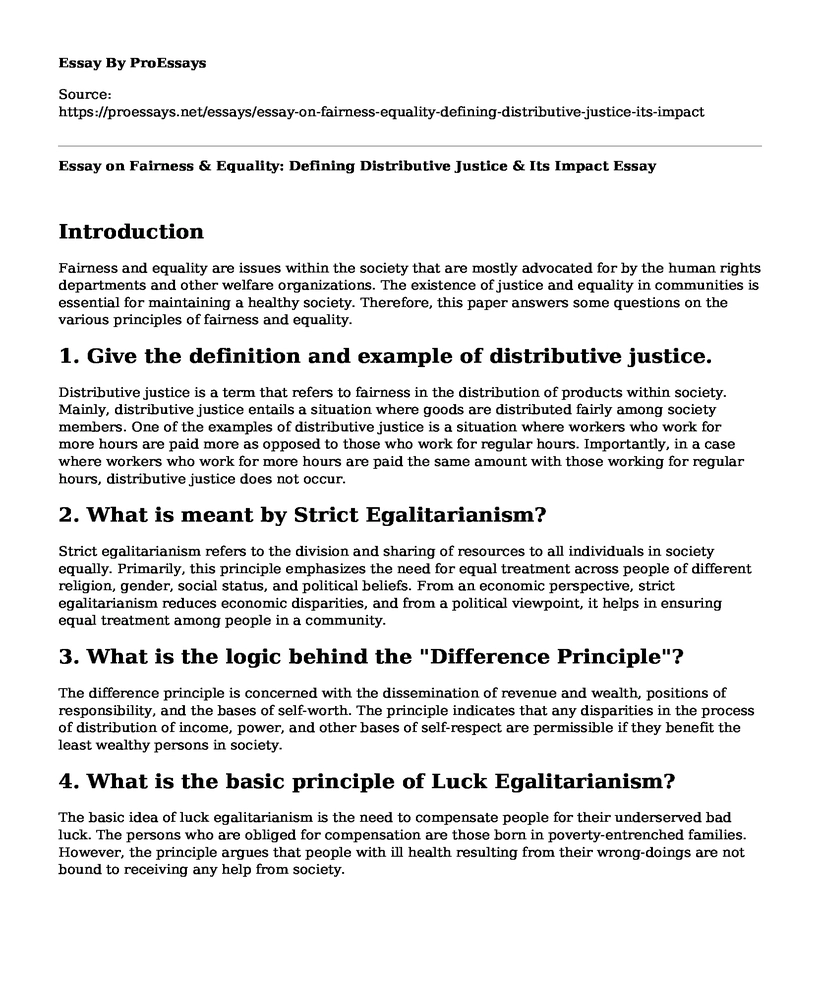Introduction
Fairness and equality are issues within the society that are mostly advocated for by the human rights departments and other welfare organizations. The existence of justice and equality in communities is essential for maintaining a healthy society. Therefore, this paper answers some questions on the various principles of fairness and equality.
1. Give the definition and example of distributive justice.
Distributive justice is a term that refers to fairness in the distribution of products within society. Mainly, distributive justice entails a situation where goods are distributed fairly among society members. One of the examples of distributive justice is a situation where workers who work for more hours are paid more as opposed to those who work for regular hours. Importantly, in a case where workers who work for more hours are paid the same amount with those working for regular hours, distributive justice does not occur.
2. What is meant by Strict Egalitarianism?
Strict egalitarianism refers to the division and sharing of resources to all individuals in society equally. Primarily, this principle emphasizes the need for equal treatment across people of different religion, gender, social status, and political beliefs. From an economic perspective, strict egalitarianism reduces economic disparities, and from a political viewpoint, it helps in ensuring equal treatment among people in a community.
3. What is the logic behind the "Difference Principle"?
The difference principle is concerned with the dissemination of revenue and wealth, positions of responsibility, and the bases of self-worth. The principle indicates that any disparities in the process of distribution of income, power, and other bases of self-respect are permissible if they benefit the least wealthy persons in society.
4. What is the basic principle of Luck Egalitarianism?
The basic idea of luck egalitarianism is the need to compensate people for their underserved bad luck. The persons who are obliged for compensation are those born in poverty-entrenched families. However, the principle argues that people with ill health resulting from their wrong-doings are not bound to receiving any help from society.
5. What is the basic idea behind Welfare-Based Principles?
The basic idea behind the welfare-based ideologies is the extent of well-being of the society members. By analyzing the welfare of the community members, one could understand if the principle of fairness applies in the dissemination of goods and services. The policies explain how the existing distribution affects welfare.
Conclusion
In summation, this paper analyzes some principles of fairness and equality aimed at maintaining a healthy society. Mainly, the policies discussed focus on the need to ensure equitable distribution of resources. Understanding these policies is critical since it provides knowledge on the steps that could be undertaken to ensure justice and fairness in societies.
Cite this page
Essay on Fairness & Equality: Defining Distributive Justice & Its Impact. (2023, Feb 09). Retrieved from https://proessays.net/essays/essay-on-fairness-equality-defining-distributive-justice-its-impact
If you are the original author of this essay and no longer wish to have it published on the ProEssays website, please click below to request its removal:
- Child Crisis Arizona: Speech
- Contemporary Moral Issues: Consent and Respect in Romantic Relationships Essay
- Changes in Parenting Essay Example
- Essay Sample on Death Penalty
- Does Home School Undermine a Child Ability to Learn How to Socialize? - Essay Sample
- Child Marriage: Causes, Effects and Prevention - Essay Sample
- Paper Example on American Factory: Hope and Frustration in Uneasy Union







